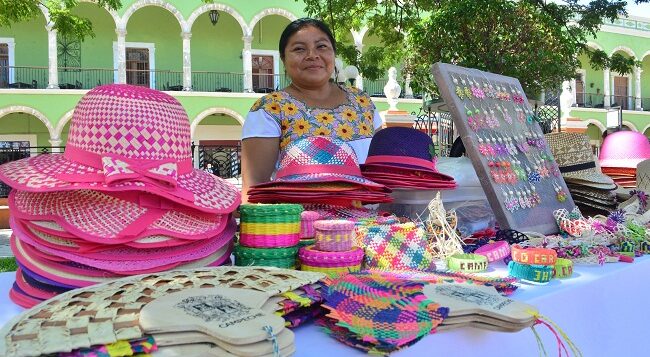Street and market vending has been the classic way to sell their products, but not now
The current virus lockdown has been hard for everyone, but particularly hard for Mexico’s artisans.
The classic way to sell handcrafts is through street and market vending. While there have been efforts by government and private organizations to take this to the next level, success has been sporadic at best.
Today, artisans face an unprecedented situation, perhaps even catastrophe. “Non-essential businesses” are shut, tourism is dead and street traffic is nil, eliminating venues that artisans rely on. Many rural communities where artisans live have shut down entirely, allowing no one in or out.
Noted handcraft researcher Marta Turok of the Franz Mayer Museum in Mexico City states, “It’s horrible. All who depend on direct sales are suffering beyond belief.” Constantino Martínez Guzmán of the Movimiento Indígenas de Artesanos Originarios de México (indigenous artists movement) states bluntly that “sales have been reduced to zero.” He adds, “We are artisans and we live day-by-day. Our people will not die of the virus, they will die of hunger.”
Even well-placed businesses are teetering on the edge. Mundo Huichol is a boutique store in Playa del Carmen. Closed for two months, owner Carlos Alejandro Cruz does not know if he can hold out. Rent is in dollars, and they just paid for their 20,000-peso business license and invested in their inventory for the year. If they cannot reopen by the end of May, they will have to close permanently.

All events related to Holy Week, a major Mexican vacation period, were canceled. The Guelaguetza, Oaxaca’s major cultural event held every July, was just canceled. A major event held in November specifically for handcrafts, the Feria de Maestros de Arte, is in doubt. Tour operators such as Tia Stephanie are waiting to see if they can go ahead with planned fall tours to artisans’ homes.
Non-governmental organizations for artisans have had to suspend all activities. These include the New York-based Friends of Oaxacan Folk Art (FOFA) and the non-profit tour and microloan organization En Vía. FOFA has been researching ways to support artisans during this time, but find that needs are so great and so widespread that “we do not know where to begin without favoring some artisans over others,” according to organization president Arden Rothstein.
Mexicans often turn to government agencies to demand help in crisis. Unfortunately, there has been limited response. The largest federal organization for handcrafts is National Fund for the Promotion of Handcrafts (FONART). As of this writing, its web page indicates absolutely nothing about the current situation, and its Facebook page only gives information on how to order from them online.

Concepción Guzmán of the Huizache Artisan Cooperative in Oaxaca reports that many people are trying to obtain state resources, but what is available is minimal. Artisans such as Arturo Jorge Navarrete and Gustavo Chiu Fong agree that they have been “abandoned” by government agencies.
In Mexico City, there have been sporadic protests in front of the National Palace and around the historic center. Most of the protesters are indigenous Trique, Zapotec, Mazahua and Otomí artisans and street vendors. Protesters have been demanding support both in cash and despensas, packages of basic foodstuffs.
Artisans qualify for other economic programs, such as those for street vendors, small businesses, and cultural organizations, but they must compete with many others who may be better organized. The governments of Mexico City and Tonalá, Jalisco, have offered 1,500 and 1,000 pesos respectively (US $63 and $42) to those who have lost employment and business.
The state of Nuevo León is offering grants to larger cultural organizations, and the federal government is offering 1 million micro-loans to family businesses. But artisan Carlo Filoteo says many of the programs are available only to those businesses that registered in the 2018 census or have bank accounts, and in some cases one must be affiliated with the Moreno party to apply.
So far only one organization has a program specifically for artisans. The Alfredo Harp Helú Foundation has pledged 5 million pesos in direct purchases from 162 artisan families in 76 communities in eight states.
This situation highlights the inability of artisans to take advantage of modern digital technology. Many, such as Alan Cruz of San Juan de los Lagos, believe it is the government’s responsibility to develop online resources. FONART used to have a national registry, but that died out.
More recently, the Mexico City Ministry of Tourism set up an online catalogue to allow for purchase and delivery in the city, but only 12 artisans participate so far. There is talk among artisans about changing this, but it remains to be seen if that will be the case when the emergency is over.
Another issue is the lack of solid organization among artisans. According to Israel Mondragón the traditional isolation of artisans makes it difficult to organize them, especially for activities that do not result in immediate sales. He heads an organization called Red de Artesanos Anáhuac that aims to do this, but getting efforts going to provide immediate relief now is difficult.
One important bit of good news is that that artisans’ health has not been affected by the virus. The concern is that their economic situation will continue to be dire long after many others have been able to recover. Feria de Maestra de Arte founder Marianne Carlson says, “This has been like living in a science fiction movie. I am very concerned that recovery for artisans may take years.”
Source: Mexico News Daily






